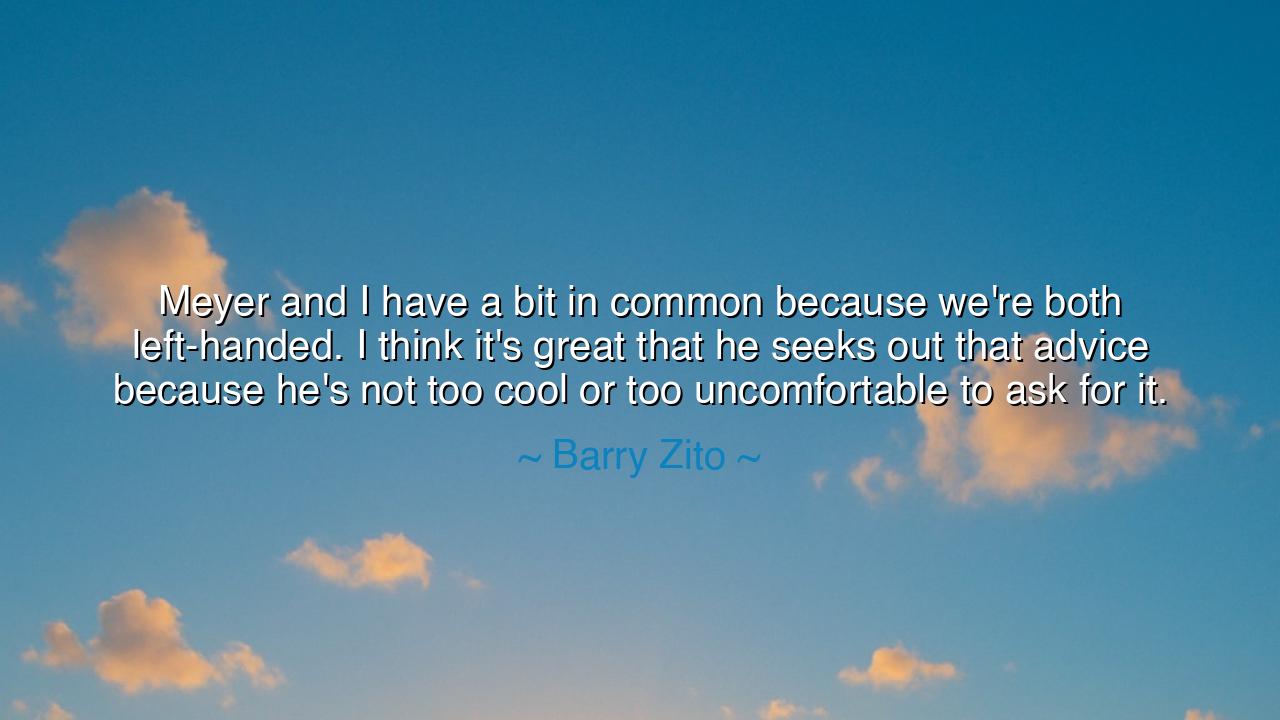
Meyer and I have a bit in common because we're both left-handed.
Meyer and I have a bit in common because we're both left-handed. I think it's great that he seeks out that advice because he's not too cool or too uncomfortable to ask for it.






In the vast expanse of human experience, there are those who are too proud to ask, too set in their ways, and too uncomfortable with vulnerability to seek the wisdom of others. Yet, there are also those who, like the great Meyer, rise above the constraints of ego, humbling themselves to ask for advice and guidance. This is a virtue that has always been revered in the annals of history, for in the asking, there lies a hidden strength—one that comes not from arrogance, but from self-awareness.
Consider the mighty generals of old, who, despite their prowess in battle, would seek counsel from their most trusted advisors before making critical decisions. Alexander the Great, though he was a conqueror of vast lands, was not too proud to listen to the wisdom of Aristotle, his teacher. His ability to seek knowledge and guidance from those who had seen more of the world, or who possessed insights that he did not, was a source of his greatness. In the same vein, Meyer’s willingness to ask for help, to humble himself before others, mirrors the wisdom of these leaders.
To ask for advice, to seek the knowledge of those who have walked the path before, is to embrace humility. Barry Zito, in his words, speaks to a unique bond that exists between those who are willing to reach out for help. His connection to Meyer is not just rooted in the fact that they are left-handed, a physical similarity that sets them apart from the majority, but in the deeper trait of being unafraid to expose oneself to vulnerability. In this act of vulnerability, there lies the true strength of character—a strength not of brawn, but of wisdom.
Indeed, in all walks of life, those who have achieved greatness have understood that the journey of learning is never complete. Like the great philosophers of antiquity—Plato, Socrates, and Aristotle—who endlessly sought wisdom, true greatness lies in the pursuit of knowledge, not in the belief that one has already attained it. The willingness to ask, to learn, to evolve, is the cornerstone of progress in every aspect of life. Whether it be in the pursuit of personal growth, professional success, or spiritual enlightenment, the act of seeking advice is an essential step in the path to greatness.
Consider the story of Leonardo da Vinci, the polymath whose works and discoveries continue to influence the world to this day. Despite his immense talent and intellect, da Vinci never ceased his quest for learning. He sought knowledge from those around him, never assuming that he knew all. In fact, many of his most profound works—whether in art, anatomy, or engineering—were influenced by his tireless pursuit of the wisdom of others. He sought feedback, asked questions, and even consulted with fellow artists and scientists. His greatness was not in his genius alone, but in his humility to ask, to listen, and to learn.
Thus, Barry Zito’s words remind us of the timeless wisdom that in the act of asking for help, in the courage to be vulnerable, there lies the true path to success. It is not about the fear of looking weak or inadequate, but about the strength to acknowledge that we are all students of life. Ask for advice, seek out the wisdom of those who have traveled the road before you, and in that pursuit, you will find your way to a greater future.
For those who seek greatness—whether in the pursuit of personal growth, professional success, or in their relationships with others—the lesson is clear. Never be too proud to ask. Seek out the wisdom of others, for in doing so, you will not only enrich your own life, but you will help pave the way for others to do the same. This is the path of true wisdom, the path that leads to both humility and greatness.






AAdministratorAdministrator
Welcome, honored guests. Please leave a comment, we will respond soon